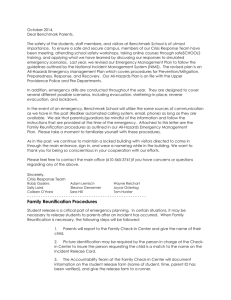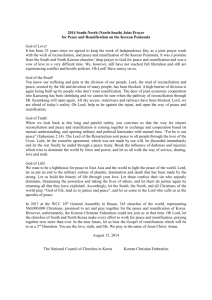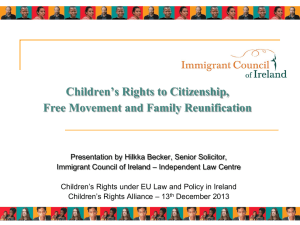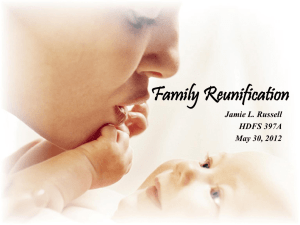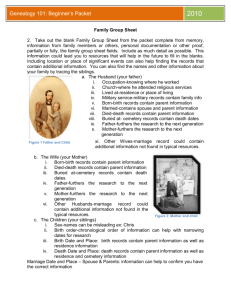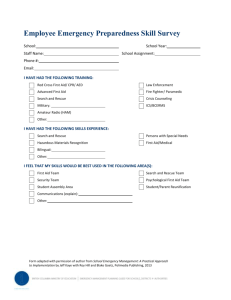Family Reunification: EU Directive Model and UK Model
advertisement
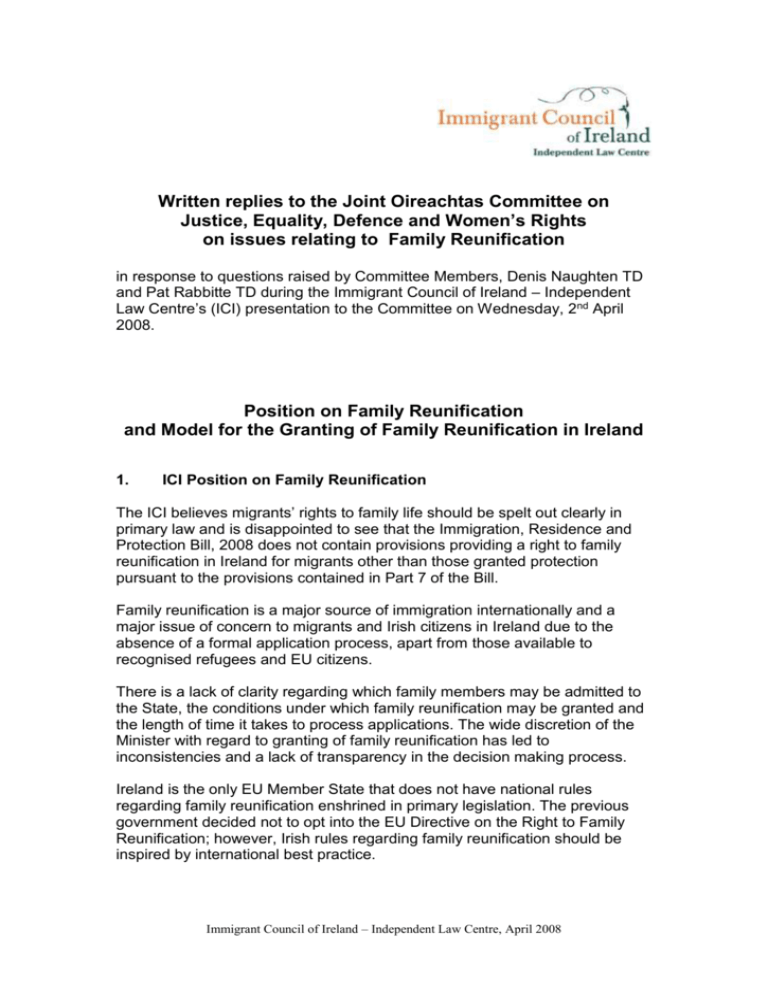
Written replies to the Joint Oireachtas Committee on Justice, Equality, Defence and Women’s Rights on issues relating to Family Reunification in response to questions raised by Committee Members, Denis Naughten TD and Pat Rabbitte TD during the Immigrant Council of Ireland – Independent Law Centre’s (ICI) presentation to the Committee on Wednesday, 2nd April 2008. Position on Family Reunification and Model for the Granting of Family Reunification in Ireland 1. ICI Position on Family Reunification The ICI believes migrants’ rights to family life should be spelt out clearly in primary law and is disappointed to see that the Immigration, Residence and Protection Bill, 2008 does not contain provisions providing a right to family reunification in Ireland for migrants other than those granted protection pursuant to the provisions contained in Part 7 of the Bill. Family reunification is a major source of immigration internationally and a major issue of concern to migrants and Irish citizens in Ireland due to the absence of a formal application process, apart from those available to recognised refugees and EU citizens. There is a lack of clarity regarding which family members may be admitted to the State, the conditions under which family reunification may be granted and the length of time it takes to process applications. The wide discretion of the Minister with regard to granting of family reunification has led to inconsistencies and a lack of transparency in the decision making process. Ireland is the only EU Member State that does not have national rules regarding family reunification enshrined in primary legislation. The previous government decided not to opt into the EU Directive on the Right to Family Reunification; however, Irish rules regarding family reunification should be inspired by international best practice. Immigrant Council of Ireland – Independent Law Centre, April 2008 Given the fundamental importance of family life to all of society, the Bill should provide a clear entitlement for Irish citizens and certain legal residents to be joined by immediate family members, including spouses or partners (including same-sex partners) and minor children. Discretionary provisions should allow for the admission of other family members, such as parents and dependent adult children, on certain conditions. In exceptional circumstances, the reunification of other categories of legal residents in the State with immediate family members should also be possible on certain conditions. 2. Model for Family Reunification in Ireland Set out below is a model that could be adopted to provide for a fair process of family reunification for Irish nationals and legally resident migrants in the State. Family reunification would include the granting of entry and residence permits to family members of Irish nationals and family members of qualifying, legally resident non-EU nationals for the purpose of both the reunification of existing families and the formation of new family relationships. 2.1. Family Reunification for Irish Nationals – Immediate Family Irish nationals, resident in the State, who are married to non-EU nationals, shall have a right to family reunification with their: spouse registered civil partner1 unmarried or same-sex partner with whom the Irish citizen is in a duly attested relationship of two years or more2 children under the age of 21 of the Irish citizen and of his/her spouse or partner, including adopted children the minor children (including adopted children) of the Irish citizen or the spouse or partner where the sponsor or spouse or partner has custody of the children, provided the other party sharing custody has given his or her agreement. The granting of family reunification to Irish nationals would be conditional on the absence of any evidence that: The definition of ‘civil partner’ would include all those who have entered a registered or civil partnership and are registered as exclusive partners with the relevant authorities of the State in which their partnership was contracted. 2 The ‘two-year’ requirement suggested here is taken from the UK Immigration Rules and should apply to both heterosexual and homosexual partners. 1 Immigrant Council of Ireland – Independent Law Centre, April 2008 2.2. the marriage was contracted or the relationship was founded or the adoption was for the sole purpose of circumventing immigration rules (‘marriage or partnership or adoption of convenience’) the Irish national or the spouse or partner were forced into the marriage or partnership (‘forced marriage or partnership’) Family Reunification with Legally Resident Migrant Workers – Immediate Family Non-EU nationals who hold a residence permit that is valid for twelve months or more and who fulfil the following conditions: are entitled to enter the labour market either on foot of a valid employment permit or on the basis of their immigration status (STAMP 4) and are in full time employment on the date of application and have an income above the threshold which would qualify the family for payment under the Family Income Supplement (FIS) Scheme administered by the Department of Social and Family Affairs – www.welfare.ie or have been in employment for at least thirty six months prior to the date of application shall have a right to family reunification with their: non-EU national spouse non-EU national registered civil partner non-EU national unmarried or same-sex partner with whom the resident is in a duly attested relationship of two years or more non-EU national children under the age of 21 of the resident and of his/her spouse or partner, including adopted children non-EU national minor children (including adopted children) of the resident or the spouse or partner where the sponsor or spouse or partner has custody of the children, provided the other party sharing custody has given his or her agreement. The granting of family reunification to legally resident migrants would be conditional on the absence of any evidence that: the marriage was contracted or the relationship was founded or the adoption was for the sole purpose of circumventing immigration rules (‘marriage or partnership or adoption of convenience’) the resident or the spouse or partner were forced into the marriage or partnership (‘forced marriage or partnership’) Immigrant Council of Ireland – Independent Law Centre, April 2008 2.3. Family Reunification with Legally Resident Students – Immediate Family Non-EU nationals who hold a residence permit that his valid for twelve months or more and who fulfil the following conditions: are registered as students with a recognised educational institution3 and are entitled to enter the labour market in line with their immigration status and have an income above the threshold which would qualify the family for payment under the Family Income Supplement (FIS) Scheme administered by the Department of Social and Family Affairs – www.welfare.ie may be granted family reunification with their: non-EU national spouse non-EU national registered civil partner non-EU national unmarried or same-sex partner with whom the resident is in a duly attested relationship of two years or more non-EU national children under the age of 21 of the resident and of his/her spouse or partner, including adopted children non-EU national minor children (including adopted children) of the resident or the spouse or partner where the sponsor or spouse or partner has custody of the children, provided the other party sharing custody has given his or her agreement. on condition that they can provide: suitable accommodation sickness insurance in addition to evidence of sufficient health insurance cover for his or her family members. The granting of family reunification to legally resident migrants would be conditional on the absence of any evidence that: the marriage was contracted or the relationship was founded or the adoption was for the sole purpose of circumventing immigration rules (‘marriage or partnership or adoption of convenience’) the resident or the spouse or partner were forced into the marriage or partnership (‘forced marriage or partnership’) 3 Currently such institutions are listed in the Register of programmes approved by the Minister for Education and Science for non-EU/ EEA/ Swiss students access to employment. Immigrant Council of Ireland – Independent Law Centre, April 2008 2.4. Family Reunification – Other Family Members Family reunification may be granted with: first degree relatives in the direct ascending line of the sponsor or his/her spouse or partner adult children of the sponsor or his/her spouse or partner who are in full-time education dependent adult children of the sponsor or his/her spouse or partner, where they do not enjoy proper family support in country of origin other dependent relatives who form part of the sponsor’s household or the household of his/her spouse or partner, where they are objectively unable to provide for their own needs In relation to the above mentioned family members, the Irish nationals or qualified sponsors will be obliged to provide evidence of 2.5. income above the threshold which would qualify the family for payment under the Family Income Supplement (FIS) Scheme administered by the Department of Social and Family Affairs –www.welfare.ie suitable accommodation sickness insurance in addition to evidence of sufficient health insurance cover for his or her family members. Family Reunification in Exceptional Circumstances The Minister for Justice, Equality and Law Reform should reserve the right to consider applications for family reunification made by persons who are not considered to be qualified sponsors and may grant family reunification in situations where the granting of family reunification is necessary to alleviate exceptional hardship on the part of the sponsor or his/her family member concerned. Factors that would have to be considered when assessing whether there is hardship include but are not limited to the sponsor’s and the family members’ safety, age, state of health, family situation and other factors regarding humanitarian or medical needs. 2.6. Process for the Granting of Family Reunification In the case of visa-required nationals, qualified family members will lodge their ‘Join-Family Visa applications’ at the Irish Embassy in the country of origin. The family member will receive a decision on their application within two months. In the case of non-visa required nationals, qualifying family members will present at the port of entry. Immigrant Council of Ireland – Independent Law Centre, April 2008 On arrival in the State, the qualified family member will be issued with an entry permit which will enable him or her to apply for a residence permit. The duration of the residence permit will not go beyond the date of expiry of the residence permit held by the sponsor, where applicable. In case of refusal of family reunification, the decision of the Minister may be appealed to the Immigration Appeals Tribunal established under the newly inserted paragraphs 52 to 57 of the Bill, as proposed by the ICI, in line with the procedures set out therein. 2.7. Entitlements of Family Members The sponsor’s family members will be entitled to access education in the State4 access to the labour market pursuant to the Department of Enterprise, Trade and Employment’s arrangements for Work Permits for Spouses and Dependants of Employment Permit Holders or access to the labour market in the same way as the sponsor, in the case of family members of Irish nationals and family members of STAMP 4 holders 2.8. Autonomous Residence Permits After three years of residency in the State on the basis of a residence permit granted for the purpose of family reunification, family members shall be entitled to an autonomous residence permit, independent of the sponsor. In the event of death of the sponsor, or in the event of separation or divorce, qualifying family members will be granted permission to remain in their own individual capacity in advance of the expiry of three years. 2.9. Refusal and Revocation of Permits A qualifying family member’s permission to remain may be refused or revoked where this can be justified on the grounds of pursuing a legitimate aim and necessary in a democratic society. Following the relevant amendments suggested by the ICI in relation to Sections 30, 31, 39 and 43 of the Bill regarding the granting, non-renewal and revocation of residence permits, the relevant Sections would apply to residence permits granted for the purpose of family reunification. 4 This would include free primary and secondary education and access to third-level education on the basis of the fees chargeable to their sponsoring family member. Immigrant Council of Ireland – Independent Law Centre, April 2008
